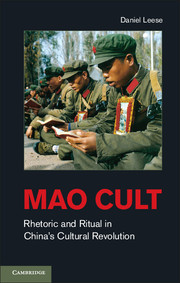Book contents
- Frontmatter
- Contents
- Illustrations, Figures, Maps, and Table
- Preface
- Chronology of Major Events
- Abbreviations
- Map Administrative divisions of China
- Introduction
- Part One Coming to Terms with the “Cult of the Individual”
- Part Two Charismatic Mobilization
- Part Three Cult and Compliance
- 7 Ambiguous Symbols
- 8 The Language of Loyalty
- 9 Rituals and Commodities
- 10 Curbing the Cult
- Conclusion
- Bibliography
- Glossary
- Index
9 - Rituals and Commodities
from Part Three - Cult and Compliance
Published online by Cambridge University Press: 07 October 2011
- Frontmatter
- Contents
- Illustrations, Figures, Maps, and Table
- Preface
- Chronology of Major Events
- Abbreviations
- Map Administrative divisions of China
- Introduction
- Part One Coming to Terms with the “Cult of the Individual”
- Part Two Charismatic Mobilization
- Part Three Cult and Compliance
- 7 Ambiguous Symbols
- 8 The Language of Loyalty
- 9 Rituals and Commodities
- 10 Curbing the Cult
- Conclusion
- Bibliography
- Glossary
- Index
Summary
It was in late 1967 that ritual forms of worshipping Mao Zedong gained widespread currency in China. The best known of these rituals, “asking for instructions in the morning and reporting back in the evening” (zao qingshi, wan huibao), had first been mentioned in June 1967 as part of the military training experiences conducted at Shijingshan Middle School in the suburbs of Beijing. The contemporary report listed the usual means of persuasion such as study classes and comparisons between past and present, but was especially outspoken about ritualistic ways of employing the Mao cult. By criticizing the evil misdeeds of Liu Shaoqi, the students were to project their “insurmountable hatred” on the real enemies and to understand the pettiness of their quarrels. The constant building up of class hatred was to be combined with public expressions of true “proletarian class feelings” toward the correct leadership of Mao Zedong. To guarantee that the students did not deviate from the teachings of Mao Zedong, the students accordingly “invented” a system of comparing their own thoughts and deeds with Mao’s sayings: “[I]n the morning, they take the problems accruing from the struggle of two lines and consult Chairman Mao’s works for instructions. In the evening, they compare the thoughts and problems encountered during the day with the teachings of Chairman Mao and carry out a self-criticism.”
- Type
- Chapter
- Information
- Mao CultRhetoric and Ritual in China's Cultural Revolution, pp. 195 - 225Publisher: Cambridge University PressPrint publication year: 2011



